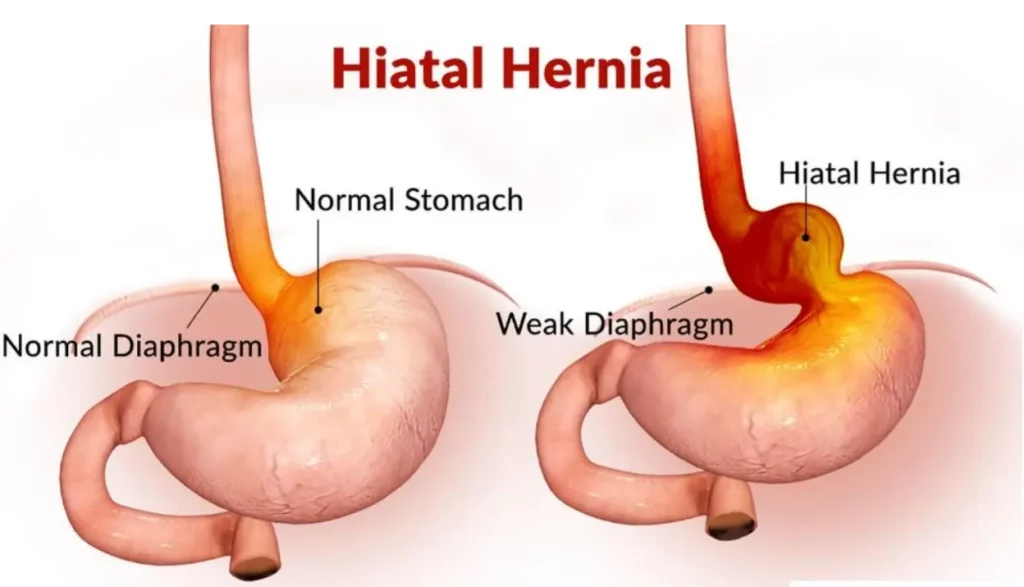
A hiatal hernia occurs when part of the stomach pushes through the diaphragm into the chest cavity. This can lead to several uncomfortable and sometimes alarming symptoms, including acid reflux (which can be painless), chest discomfort, palpitations, and trouble swallowing. I see this issue mor and more commonly in my practice. When diagnosed early (if symptoms are now) it can be delt with quickly with manual adjustment and nutritional/ lifestyle changes. Let’s explore how a hiatal hernia can cause these issues and what you can do to manage them.
How a Hiatal Hernia Causes Acid Reflux
The diaphragm normally helps keep stomach acid in check by creating pressure around the lower esophageal sphincter (LES). When a hiatal hernia occurs, the stomach bulges through the diaphragm, weakening the LES. This allows stomach acid to flow back into the esophagus more easily, leading to acid reflux or gastroesophageal reflux disease (GERD).
Symptoms of Acid Reflux:
- A burning sensation in the chest (heartburn)
- Regurgitation of food or sour liquid
- Difficulty swallowing
- A persistent cough or sore throat. Raspy voice in the morning for no reason.
If left untreated, chronic acid reflux can damage the esophagus lining, increasing the risk of more severe conditions such as Barrett’s esophagus or esophageal cancer.
Chest Discomfort and Palpitations
One of the more unsettling symptoms of a hiatal hernia is chest discomfort. This occurs because the hernia puts pressure on the chest cavity, which can be mistaken for heart-related pain. Many people describe it as a tightness or heaviness in the chest.
Additionally, the proximity of the stomach to the heart can sometimes lead to heart palpitations. When the stomach is displaced into the chest cavity, it can press against the vagus nerve, which plays a crucial role in heart rate regulation. This can cause feelings of skipped heartbeats or fluttering.
Chest Discomfort vs. Heart Attack: It’s important to distinguish between the discomfort caused by a hiatal hernia and a potential heart attack. Hiatal hernia symptoms tend to be related to eating, lying down, or bending over, and they often improve when standing up. However, if you experience sudden chest pain, especially with shortness of breath or arm pain, seek medical attention immediately.
Difficulty Swallowing and Eating Discomfort
Hiatal hernias can also make swallowing food (a condition called dysphagia) uncomfortable or even painful. This happens when the hernia puts pressure on the esophagus, making it harder for food and liquids to pass smoothly into the stomach. My patients will report difficulty swallowing pills or food getting stuck. This can lead to:
- Avoiding certain foods that trigger discomfort
- Eating smaller portions to reduce symptoms
- Feeling full more quickly than usual
- Feeling like you cannot take a full breath
Managing Hiatal Hernia Symptoms
While hiatal hernias are often manageable with lifestyle changes, it’s essential to address the symptoms to avoid complications. Here are some steps you can take:
- Manual adjustment: I have wonderful results adjusting hernias in my patients. Many times new onset reflux can resolve after just a few adjustments as long as the causative factor has been addressed. If you do not have Naturopathic Doctor ask your Chiropractor or DO if they can perform this adjustment for you. It is also something you can do at home with a little instruction.
- Adjust Your Eating Habits:
- Eat smaller, more frequent meals to reduce pressure on your stomach.
- Avoid lying down immediately after eating.
- Avoid trigger foods like spicy dishes, alcohol, coffee, onions, black pepper, etc.
- Elevate the Head of Your Bed: Raising the head of your bed by a few inches can help prevent acid from flowing back into the esophagus while you sleep.
- Maintain a Healthy Weight: Excess weight can increase abdominal pressure, worsening hernia symptoms. Gradual weight loss can help relieve this pressure and improve overall digestion.
- Medications: Over-the-counter antacids, H2 blockers, or proton pump inhibitors can help reduce stomach acid and alleviate symptoms. However, it is important to understand these medications are not meant to be a solution but a band-aid only. You NEED to figure out the root cause of your reflux in order to truly heal.
- Surgical Options: In severe cases, surgery may be necessary to repair the hernia and reduce symptoms. This is typically considered if lifestyle changes and medications are not effective.
